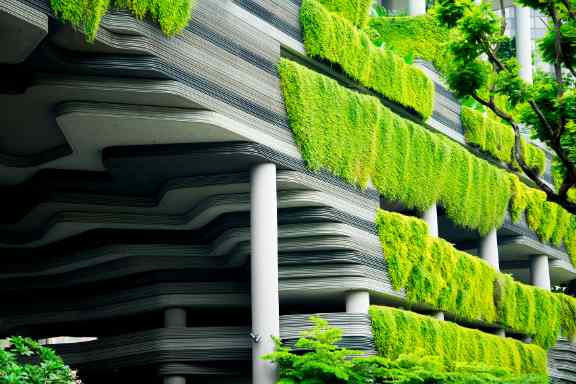In an era where environmental consciousness is on the rise, the hotel industry is embracing green initiatives like never before. Today's guests expect environmentally friendly practices and are drawn to hotels prioritizing sustainability.
In this article we will explore the top 8 green hotel design trends of 2023 that will not only impress your guests but also contribute to a greener future.
In this article:
1. Biophilic Design
Biophilic design, which integrates natural elements into architectural design, is gaining popularity. From living walls to natural lighting, this trend creates a more enjoyable and calming experience for guests, connecting them with nature even in urban environments.
1 Hotel Brooklyn Bridge, New York City, USA
This hotel is known for its sustainable and nature-inspired design, aiming to bring guests closer to nature while providing a luxurious experience. Where nature meets urban sophistication. Reclaimed materials, lush greenery, and stunning views of the Brooklyn Bridge and Manhattan skyline create an eco-friendly oasis in the heart of New York City.
Hotel website: 1 Hotel Brooklyn Bridge
2. Energy-Efficient Lighting
Hotels are transitioning to energy-efficient LED lights and smart systems to reduce energy consumption. This not only helps the environment but also allows guests to personalize their lighting preferences, creating a pleasant and mood-enhancing atmosphere.
Hotel Verde, Cape Town, South Africa
Hotel Verde is known as Africa's greenest hotel and has received multiple awards for its sustainable practices. The hotel uses energy-efficient lighting in a number of ways, including by implementing motion sensors in various locations and maximizing natural light by including wide windows and skylights in public spaces and guest rooms.
Hotel website: Hotel Verde
3. Sustainable Building Materials
The use of recycled, renewable, and low-impact materials in hotel construction and design is rising. Incorporating sustainable materials minimizes environmental impact and enhances guests' sense of staying in a space that values ecological responsibility.
Hotel Proximity,North Carolina, USA
This hotel is located in Greensboro, North Carolina, USA. This boutique hotel is designed with a strong emphasis on sustainability and environmental responsibility. The hotel supports resource conservation, lowers its carbon footprint, and produces a healthier and more sustainable environment for its staff and visitors by utilizing products with low environmental impact.
Hotel website: Hotel Proximity
4. Water Conservation Systems
Hotels are increasingly adopting water-saving technologies and practices. High-pressure, low-flow showers and efficient plumbing systems save water and provide guests with a luxurious and eco-conscious bathing experience.
Bardessono Hotel and Spa, California, USA
In Yountville, California, USA. Bardessono is a LEED Platinum-certified hotel, recognized for its exceptional sustainability practices by implementing these measures, the hotel reduces its water footprint, promotes responsible water usage, and serves as an example for the hospitality industry in sustainable water management.
Hotel Website: Bardessono Hotel and Spa
5. Rooftop Gardens and Green Walls
Green roofs and walls are becoming more popular in hotels, offering aesthetic appeal and serving as thermal insulation. These green spaces provide guests with areas for relaxation and socialization, promoting a sense of well-being.
Oasia Hotel Downtown, Singapore
An excellent example of a hotel that incorporates rooftop gardens and green walls is the Oasia Hotel Downtown in Singapore. The hotel stands out for its innovative biophilic design and extensive use of greenery throughout its exterior and interior spaces.
Hotel website: Oasia Hotel Downtown
6. Solar Power Integration
Hotels are integrating solar power into their energy mix, leading to a more stable energy supply and reducing their carbon footprint. Guests can enjoy a greener stay, knowing that the hotel's energy comes from renewable sources.
Hotel Schloss Elmau, Elmau, Germany
Which is located in Elmau, Germany. This luxury hotel is located in the Bavarian Alps and has made significant efforts to incorporate renewable energy sources into its operations. Solar power plays a vital role in its sustainability initiatives. Solar energy will help reduce the hotel's carbon footprint, decreases dependence on traditional energy sources, and sets an example for other establishments in the hospitality industry to adopt renewable energy solutions.
Hotel website: Hotel Schloss Elmau
7. Locally Sourced Amenities
Hotels are embracing locally sourced amenities, from food to toiletries, to support local businesses and reduce transportation emissions. Guests appreciate the authenticity and quality of these items, which contribute to a unique and sustainable experience.
The Siam Hotel, Bangkok, Thailand
In Bangkok, Thailand. This luxurious boutique hotel showcases a strong commitment to supporting local artisans and promoting the cultural heritage of Thailand. It embraces sustainable practices and contributes to the local economy and culture. It allows guests to connect with the rich heritage of Thailand while supporting local artisans, suppliers, and communities.
Hotel website: The Siam Hotel in Bangkok
8. Waste Reduction Initiatives
Comprehensive recycling programs, composting initiatives, and efforts to reduce single-use items are becoming commonplace in hotels. These waste reduction measures allow guests to maintain their own sustainability practices while traveling, fostering a sense of responsibility.
The Park Hotel, Chennai, India
In Chennai, India is a prime example of a hotel that excels in waste reduction initiatives. This hotel has implemented a waste management system that includes recycling, composting, and bio-gas generation from food waste. They have also replaced single-use plastic items with eco-friendly alternatives.
Hotel website: The Park Hotel
Conclusion
The top 8 green hotel design trends of 2023 are not only in line with the expectations of modern hotel guests but also have a significant impact on the future of the hotel industry. By embracing these trends, hotels can create sustainable and memorable experiences while contributing to a greener planet. Hospitality professionals are encouraged to consider these trends when planning their own green initiatives, as they align with guest preferences and play a crucial role in shaping the future of the industry.
Craving for more eco-savvy tips? We've covered all the key sustainable strategies in this article that can seriously ramp up your hotel's brand allure.
Book a free demo with us ↓
Do you want to learn more about voice AI technology for hotels? Sign up for a free demo.


